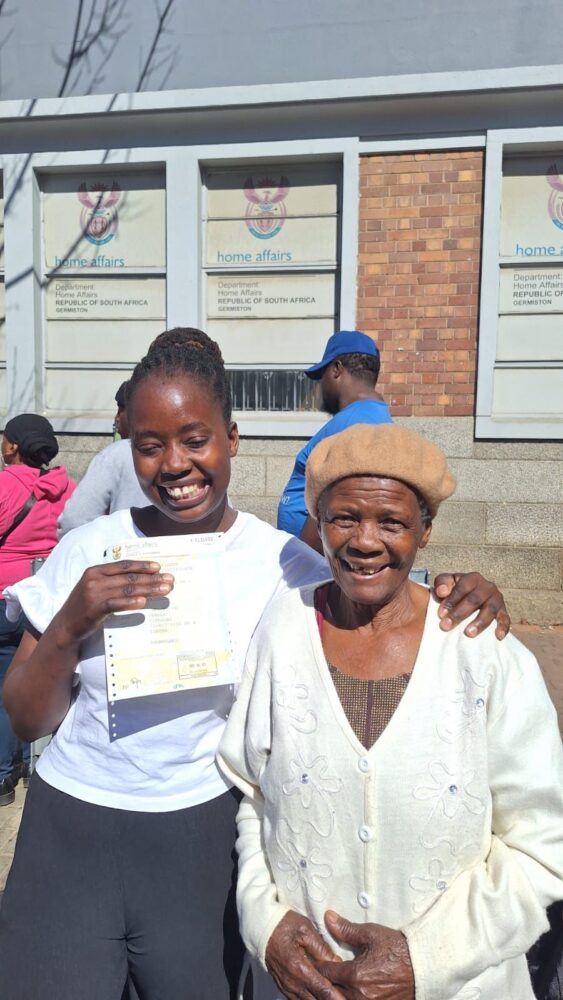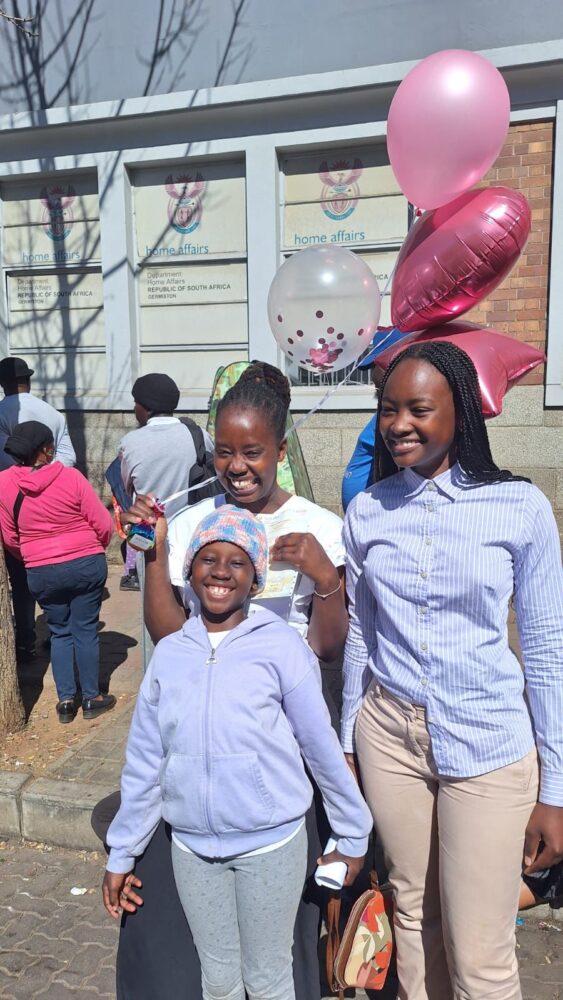Primrose Modisane, who was born in Zimbabwe, has battled to have her South African citizenship recognised despite being entitled to it by descent through her grandmother
When Primrose Modisane finally held her South African birth certificate in her hands on Tuesday, she struggled to believe it was real.
After a lifetime of being invisible, the “stateless” mother of two exists on paper at last. She stared at the name — her name — and her tears blurred the proof that she never thought that she would see.
“I can see my name and my surname on it but I still can’t believe that this is my paper that I’m holding in my hands,” said the 36-year-old, her voice breaking into a laugh soaked in disbelief and joy. “Maybe it will just take time for me to like, believe it, that this is really happening today.”
In a struggle that has spanned more than a decade, Modisane, who was born in Zimbabwe, has battled to have her South African citizenship recognised and to obtain documentation.
In April, the high court in Pretoria confirmed that she is a South African citizen by descent, through the matriarch of the family, her grandmother Barbara Modisane — a South African born in the 1940s in the former Transvaal.
 Primrose Modisane and her grandmother Barbara Modisane.
Primrose Modisane and her grandmother Barbara Modisane.
The court ordered the department of home affairs to recognise her citizenship under section 2(1) of the Citizenship Act and to register her birth and issue her with a birth certificate and identity document (ID) within 30 days. Modisane was assisted by the nonprofit, Lawyers for Human Rights.
Yet more than four months later, and despite extensive documentation, DNA tests, school records, sworn affidavits and even the support of parliament’s portfolio committee on home affairs, she remained undocumented.
A media briefing had been scheduled on Tuesday, led by Judge Johann Kriegler, a former Constitutional Court justice and renowned human rights advocate, where Modisane was due to share her story.
But, on Monday afternoon, the department notified her that her South African birth certificate was ready for collection from its offices in Germiston, on the East Rand.
That Modisane has finally attained the document that affirms her rightful status as a South African, still feels like a dream. “I didn’t sleep [on Monday night],” she said. “I sent Sophia [Welz, her part-time employer and co-campaigner] a message at 2.30am that I don’t know if it feels like this to be a citizen, but I can’t sleep.”
For the first time in her life, Modisane feels seen and recognised. “The way we were welcomed when we walked into home affairs; I can feel that I’m also important, that I have rights and that I’m also a human being.”
Her ordeal should never have taken this long, noted Kriegler.
“It should not take a court order, and the threat of a media briefing for a South African citizen to be acknowledged in her own country,” he said.
“While we celebrate this development, we must also reflect on the many other individuals who remain stateless and unheard and recommit to ensuring that no one else is forced to fight this hard for something that should be automatic and just.”
Thulani Mavuso, the spokesperson for the department and the deputy director general for operations, told the Mail & Guardian that registration of the birth of the applicant was concluded after the period stipulated by the court.
This was “because of legal consultations the department had to undertake in light of the lack of documentation required for foreign births, as per regulations on the South African Citizenship Act, 1995, as amended”.
“Before the court judgment, the applicant had submitted an application for foreign birth without the required full birth certificate, verified by the country of origin (Zimbabwe),” Mavuso said.
Getting her South African ID will unlock access to essential rights and services, including healthcare, education for her children, social assistance and financial inclusion, to which she has always been entitled.
 Primrose Modisane and her children.
Primrose Modisane and her children.
The first thing Modisane wants to do is open her own bank account, record her name on her daughters’ birth certificates (she couldn’t do that without an ID) and register her youngest child for school. “Then I will go to my mother’s grave in Vosloorus and tell her that this suffering is finally over.”
Without an ID, Modisane couldn’t vote, drive, or even walk the streets freely without fear of being attacked or arrested.
“We’re going to go on an aeroplane to Cape Town,” Welz added. “And we’re going to get a learners licence and then a driver’s licence for Primmy. Also, we’re going to do a will for Primmy and a funeral policy and all of the things that her mom didn’t get, which was really awful when she died.
“It’s affected everything,” Welz said, including that Modisane also could not apply for a school fee exemption for her daughter.
“She couldn’t even take a long-distance bus … You can’t just freely go anywhere without first checking out your route and making sure that [Operation] Dudula isn’t here, or having that kind of thought in your head that this might happen,” she said, referring to the vigilante group cracking down on undocumented foreign nationals. “Thankfully, it has never happened to Primmy.”
Modisane’s mother, Phumulani Tshuma, who was also born in Zimbabwe, received her documentation just weeks before she died of untreated oesophageal cancer in 2023, after years of being denied hospital access because of her own undocumented status.
Modisane realised that her daughters, Ayanda, 9, and Nosipho, 16, inherited her undocumented status when the department refused to register their births because of her lack of documents until the court intervened. This was despite the father being a documented South African citizen and available to register the children.
Her own realisation of her unregistered and undocumented status came during a documentation drive by the department in 2010 while she was in grade 11 and due to write her matriculation exams, for which she needed her ID.
Unable to complete her education, she became a domestic worker and had to abandon her dream of becoming a social worker.
“I think my kids already have a bright future but I would love for my kids to have a better education than I did because I didn’t get that chance,” said Modisane.
Her court documents exposed the “extreme hostility” from the department’s officials, including one who castigated them for what she perceived as escalating the matter to the parliament portfolio committee and reprimanded them for thinking their case was “special”.
She instructed them to retell their story “because you told lies in parliament and now they need me to send a report”. She accused Barbara Setontorwane Modisane, a woman of 80 years, of being an “illegal immigrant” because she only had a green book ID and a smart card ID, but no dompas.
According to the court documents, the official also directed aggressive, demeaning and xenophobic questions at Phumulani Tshuma, repeatedly shouting, “how did you cross the border” and “you are illegal” and labelling her a “border jumper”.
Primrose Modisane receives her birth certificate at 36 years of age.
The problem lies with officials at home affairs, Modisane said. “I don’t think the problem is with the government, I think it’s the people that we meet, the attitudes that we get from the people that are behind the desk.
“They don’t tell you exactly what to do; they just push you away, [saying] ‘no, we don’t do this’, or ‘no, go somewhere else’ without giving you the right information. What we need is the right information that if you need this, you must have this kind of documents or you need to go here from here to do this.”
Welz said xenophobia or Afrophobia is “so strong in those places. And I think that they’re also overwhelmed but there’s never like, ‘who are you speaking to, who did your application go to. Where did it go’? It just goes behind this fortress so you can never get information on how far your application is.
“With Primmy’s late mom, she came back [to home affairs] every month for over a year, and they kept saying, come back later; come back in a year, come back in a month, come back in three months, six months and they … don’t say why, what the delay is. And actually they have no intention of fulfilling what they said they were going to do.
“And then you lose hope. You lose steam. I think if we didn’t have both of us doing this in a kind of tag team, and if we didn’t have kids to do it for, we would have given up ages ago because it’s so strenuous.
“[It’s] like there’s a whole section in your life that is just dedicated to standing in queues at the department of home affairs or arguing with people or having people hurl abuse at you that you don’t belong in this country. It’s not something anybody wants to do. It’s a bit like going to the dentist every day; you don’t want to do it,” she said.
Welz said that there are hundreds of thousands of stateless children who need to go to school. “I would tell the government to figure out what form you need to create to make it possible for them to apply for documents because they’re here, they’re not going anywhere. You might as well create tax-paying citizens as opposed to this whole segment of society that just doesn’t have access to anything.”
Modisane’s ordeal shows the power of using one’s voice, she added. “We have a voice — you need to use it. It’s hard but even with all of this pressure and all of this help, it was unbelievable that you go to the legislature, you go to the judiciary, you go to all these places, you go through all the official channels you’re supposed to, do all the right things and yet you still don’t get help.”
The two women’s enduring friendship was forged in the Covid-19 lockdown, she said. “A lot of what happened during the lockdown spoke to me about the inequality [in South Africa] and I know that it still exists. But I think that everybody has a duty to do what they can in their situation to make those inequalities less because that creates problems for everybody.”
Modisane’s story represents the bureaucratic erosion of dignity — and the courage of a woman who refused to be erased.
“Primmy is just decent and you can’t say no to Prim,” Welz added. “She is quiet but she’s steadfast and has a lot of persistence.”
*The story has been updated with comment from the home affairs department